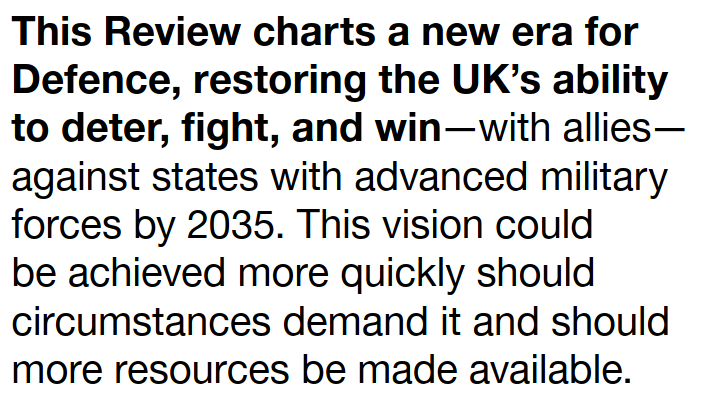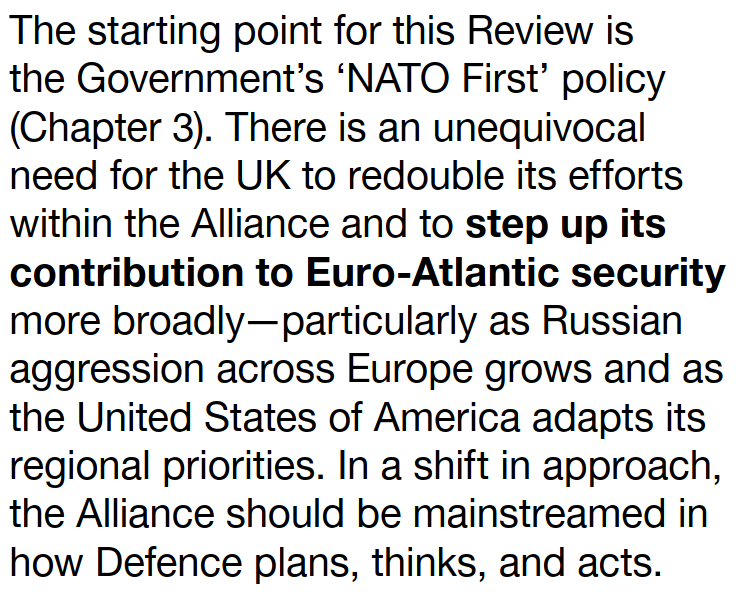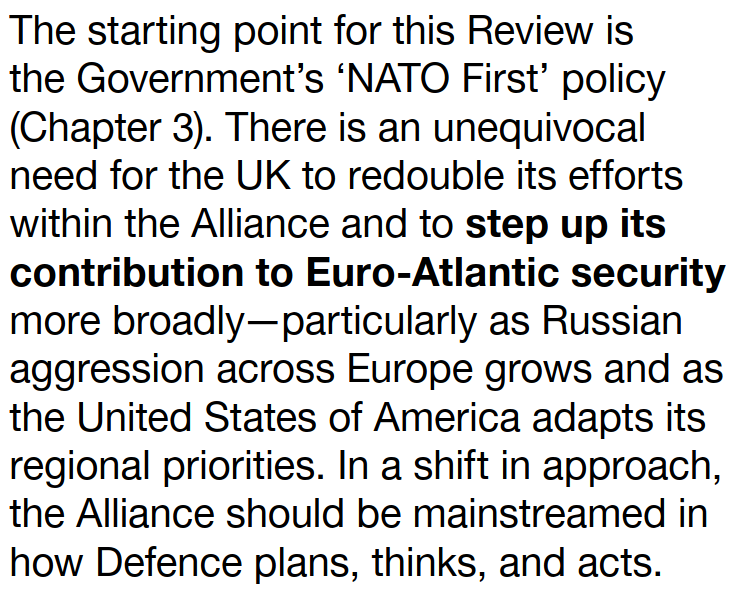UK Defence Review - Innovation, Private Finance, and a surprising lack of urgency

The UK's long-awaited Strategic Defence Review was finally published on the 2nd June 2025. Avoiding the 'hot takes', I took a detailed look at a document that is more significant for what it doesn't say than what it does. The review is rumoured to have bounced back and forth between the Review Team and Government several times, and it's unlikely this final version truly represents the team's thoughts on the clear and present dangers that the UK and our allies face. Maybe innovation and private finance will save the day?
There was a lot of 'pre-briefing' of the SDR by the Government in the run-up to the release of the document, which itself caused controversy when it became apparent that the full SDR had been provided to selected journalists and industry figures several hours before it was given to MPs. That is turn meant that MPs went into the Parliamentary debate without having the chance to read it first. It's important to note that some of the biggest headlines, for example "up to" 12 AUKUS submarines did not actually come from the SDR itself, and were only in the foreward by the Secretary of State.
The 2.5% GDP spending constraint sucked the urgency out of the Review

The elephant in the room is that once the Review Team accepted the 2.5% GDP defence spending constraint in their terms of reference, they were hamstrung from drawing the obvious conclusion that greater urgency is required, as meeting that urgency would require expenditure outside of the envelope. The Review is left peppered with statements such as "when funding allows" or "should circumstances allow it" rather than acknowledging the imminent threat and challenging the Government on the adequacy of the defence budget.
If the US twitches, the MOD falls out of bed

For example, recent weeks have seen news that the US Marine Corps is cutting its order for F-35B aircraft in favour of more 'C' models, and that the Trump administration is reviewing the AUKUS programme in light of their "America First" policies. The former reduces production volume of the F-35B variant and so pushes up the unit price of the aircraft for allies such as the UK, and the latter could ruin the UK's plan to have a replacement for Astute Class submarines delivered on time at a remotely affordable price.
The UK's dependence on the US for equipment and support is so great that the Review simply ignores it, as the implications of lessening that dependence are too dramatic to acknowledge.
Will 2025 finally be the year we admit we can't do everything?

A genuine 'NATO First' posture means that the UK can finally stop trying to procure and maintain every capability, and instead focus on the defence of the Euro-Atlantic as part of NATO. For instance, does it matter if the UK has fewer than 150 tanks if the Germans and Poles have thousands? What does matter is the UK having sufficient air and naval assets to protect sub-sea and critical national infrastructure, North Atlantic trade routes, and defend against attacks from the High North.
Without the right people, everything else fails
Without doubt, the biggest challenge facing UK defence is not insufficient or obsolete equipment, but the recruitment and retention crisis in the Armed Forces and Royal Fleet Auxiliary, and the skills gaps in the civilian MOD. Years of uncompetitive pay, disgraceful accommodation, dysfunctional recruitment and clogged-up training pipelines mean that Army numbers have under-shot the intended reduction in numbers and experienced personnel from all services are leaving in droves.
The Government has announced plans and funding to tackle housing, along with above-inflation pay rises for the Armed Forces. When coupled with the promise of increased career flexibility, this may do enough to make the 'retail offer' of military life more attractive, but as long as the private sector is offering salaries 30+% higher for personnel with specialist skills and experience, any flexibility is likely to create mostly one-way traffic.
Meanwhile, the Infrastructure and Projects Authority's Annual Report continues every year to highlight that a lack of skilled and experienced personnel is a risk factor holding back the delivery of major defence projects. With a target to reduce MOD Civil Service costs by at least 10%, it will be a challenge for the MOD to retain staff with specialist skills much sought-after in the private sector to improve programme delivery whilst "Accelerating efforts to harness Artificial Intelligence (AI), automation, and augmentation technology".
Innovation saves the day?
Everyone is furiously agreeing that defence needs innovation, and everyone loves Small & Medium Enterprises (SMEs). However I've written before about how hard defence is for SMEs and start-ups, because the MOD is basically a rubbish customer. It's difficult to break into, its demand forecasts are almost worthless, and it ties up suppliers with reams of unnecessary contract boilerplate and paperwork.
The SDR, not for the first time, recognises these problems and demands solutions, without doing much to suggest what the answers are. There is some 'buzzword bingo':
Prioritising UK‑based business, Defence should aim high: success should be measured in the number and scale of deep tech suppliers in the UK in areas such as Artificial Intelligence (AI), autonomy, advanced manufacturing, quantum, and space - with high-Intellectual Property (IP) companies delivering leading-edge capabilities for Defence while creating high-skilled, high-paid jobs and driving exports in software, IP, and equipment.
all of which ignores the fact that you still also need old-fashioned metal-bashers producing hardware for you. In other areas the SDR gives the impression that the Review Team listened to certain vested interests about how the system should work better for them, rather than fundamentally re-thinking how the relationship between defence and industry could work.
For instance, the Review proposes two new 'innovation' bodies - the Defence Research and Evaluation (DRE) organisation, and the UK Defence Innovation organisation. The remit of the DRE is early-stage research and to "act as a gateway to academia and research institutions across the UK and allied countries" which fails to acknowledge that R&D and innovation takes place within industry as well.
The remit of the new UK Defence Innovation Organisation is to "provide the mechanism by which Defence quickly finds and then buys innovative commercial products and services from the UK and allied countries", and so still operates on a 'customer pull' model that assumes that the MOD is a smart customer deeply familiar with the state of the art, and therefore always knows what to ask for. In reality, the long standing problem in the defence world is that new suppliers struggle to make contact and get a sympathetic hearing when they want to offer entirely new technology, capabilities or ways of working to a change-resistant MOD still wedded to the traditional Capability > Requirement > Procurement mode of working. It will also be "responsible for developing regional clusters" when the concept of 'regional clusters' is an increasingly outmoded form of industrial strategy. Why does geographic location matter in the 21st Century when hybrid working and video conferencing are the new normal?
Flexibility, exportability and PFI Mk II
The Review contains a brief mention of a significant change I have long argued for - greater in-year budgeting flexibility. This would require the Treasury to loosen its tight grip on the budgeting process but would reduce the 'annuality' of the MOD's management of its budget, and should be linked to finally banning the 'over-programming' budgets and presenting plans to spend more money than is actually available in any given year. With a new National Armaments Director (NAD) taking responsibility, it's about time:
In-year funding flexibility would allow the NAD to move resources where they were most needed within a portfolio.
The Review also recognises the need for exportability to be central to requirement setting and procurement decisions, something that the UK has traditionally been very poor at.
There are interesting proposals regarding attracting private finance to the defence sector and using new funding models. This sounds very much like the Private Finance Initiative (PFI) introduced by the previous Labour Government with mixed results:
In particular, Defence should build relationships with the investors behind the innovators. External expertise should be systematically accessed through a new Defence Investors’ Advisory Group whose membership includes venture capital and private equity investors, while private finance should be crowded in under new funding models.
A fly on the wall at those new Advisory Group meetings are likely to hear potential investors telling the MOD that they need to become a much more reliable customer than they are now. They will also certainly hear that private equity investors will be seeking a higher return on their investments than the 8.56% baseline profit rate that the Government currently allows for single-source contracts. As with previous PFI initiatives, this may well unlock early private investment and enable industry to develop new products and scale up production in the short term, but at the expense of increased costs in the long term.
Ultimately, the 2025 Strategic Defence Review is disappointing, and a missed opportunity for the Government to prepare the British public for the need to ramp up defence spending quicker. Deterring a war is cheaper and less painful than fighting one, and to do that the UK needs greater capability and mass in three years time, not ten. This SDR doesn't set us on that course.




